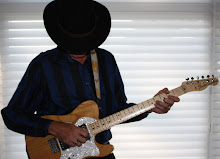Saw a PBS special a while back entitled Women Who Rock.
I usually put such shows on as time fillers, not expecting to learn - or be
entertained - all that much.
It was pretty good though. Cyndi Lauper did an impressive job as host.
Knowledgeable, passionate – and, of course, fun.
Lots of familiar territory and expected coverage: Carol King, Janis Joplin, Aretha
Franklin, the Wilson sisters from Heart. But a couple of surprises. Never heard
of Wanda Jackson before. Don't know how I missed her, but glad to have that
little gap in my history databanks plugged. The other surprise was no coverage
of Fleetwood Mac.
You kidding me? Weren't they like the biggest band in the world for a couple of
years, with not one but two women singing, playing and writing? Kinda strange.
Two small insights came at me:
1) Sister Rosetta Tharpe really was vastly influential. The male testosterone
dominated pantheon of guitar heroes borrowed a lot from her. A lot.
2) Madonna has a lot to answer for. The show covered a lot of female artists
who have arisen in the last 20 years, and made a big deal about the music scene
actually being (finally) dominated by women. That may be, but are they rockers
or dancers? With a few notable exceptions, like, say, Christine Aguilera, the
voices aren't noteworthy at all. But the dancing's pretty good, I guess.
It kinda confirms this uneasy feeling I've had for a long time now. It's about
the marketing, not the music. Eye candy and Broadway, not rock and roll. Would
Janis Joplin or Chrissie Hynde even get a record deal now?
You gotta admire what Madonna has accomplished, but I'm not sure she did us any
favours.
